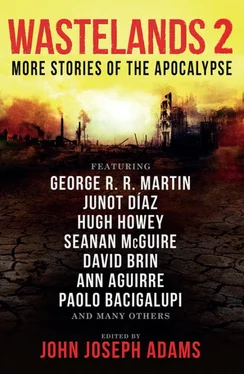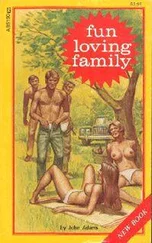Carson raised his head. Other than the grass under the tree, most of the yard was dirt. The lot was longer than it was wide. At the end farthest from the house a chicken wire enclosure surrounded the poultry. A couple hens sat in the shade by the coop. No pool. When he’d gone house hunting, he’d toyed with the idea of a pool, but the thought of trying to keep it filled and the inevitable problems with water chemistry made him decide against it. The house on the other side of the privacy fence had a pool, as did most of the houses in the neighborhood, now empty except for the scummy pond in the deep end. In the spring he’d found a deer, its neck bent unnaturally back, at the bottom of one a block over. Evidently it had jumped the fence and gone straight in.
“Are you hungry?” Carson asked.
Tillie tilted her head to the side. “When will the garden grow again?”
He pushed himself off the ground. “I’ll fix eggs.”
Later that evening, he tucked Tillie into bed. The room smelled of peppermint. From the bulge in her cheek, he guessed she was sucking on one. In a little-girl voice, she said, “Can you put in my video?” Her expression was alert, but her eyes were red-rimmed and watery. He smiled. This was as good as she got. Sometimes he could play gin rummy with her and she’d stay focused for an hour or so before she drifted away. If he asked her about her past, she’d be unresponsive for days. All he knew about her came from the suitcase she carried when he’d found her. There was a sheet of letterhead with a name at the top: “Tillie Waterhouse, Marketing Executive,” and an athletic club identification card with her picture and name. But there was no Tillie Waterhouse in the Denver phone book. Could she have wandered away from the airport when air travel was canceled? The first words she had said to him, when she finally spoke, were, “How do you bear it?”
“Did you have a good day?” He turned on the television and pressed rewind on the VCR.
Her hands peeked out from under the covers and pulled them tight under her chin. “Something magical is going to happen. The leaves whispered to me.”
The video clicked to a stop. “I’m glad to hear that,” he said. The television flickered as the tape started, a documentary on the 2001 New York City Marathon a decade earlier. It opened with a helicopter flyover of the racers crossing the Verrazano-Narrows Bridge into Brooklyn. The human crowd surged forward, packed elbow-to-elbow, long as the eye could see. Then the camera cut to ankle level. Feet ran past for five minutes. Then it went to face level at a turn in the course. The starting crush had spread out, but the runners still jogged within an arm’s length of each other, thousands of them. Carson had watched the video with her the first few times. The video was a celebration of numbers. Thirty-thousand athletes straining over the twenty-six-mile course through New York City’s five boroughs.
“Here’s the remote if you want to watch it again.”
“So many American flags,” she said.
“It was only a month after that first terrorist thing.” Carson sat on the end of her bed. Some runners wore stars and stripes singlets or racing shorts. Others carried small flags and waved them at the camera as they passed.
“I won’t be able to sleep,” she said.
He nodded. “Me either.”
Before he left, he pressed his hand to her forehead. She looked up briefly, the blanket still snug against her chin. A little fever and her breath sounded wheezy.
Later that night he made careful entries in his day book. A breeze through the open window freshened the room. He’d spotted a mountain plover, a long-billed curlew, a burrowing owl and a horned lark, plus the usual assortment of lark sparrows, yellow warblers, western meadowlarks, red-winged blackbirds, crows, black terns and mourning doves. Nothing unusual beside the strange bird in the starling flock. Idly he thumbed through his bird identification handbook. No help there. Could it actually be a new bird? Something to add to his life list?
Tomorrow he’d take the camera. Several major flocks roosted in the elms along the Platte River. He hadn’t done a riparian count in a couple months anyway. After visiting the distribution center, he’d go to the river. With an early enough start, he would still have ten hours of sun to work with.
He shut the book and turned off his desk light. Gradually his eyes adjusted as he looked out the window. A full moon illuminated the scene. From his chair he could see three houses bathed in the leaden glow, their windows black as basalt. His neighbor’s minivan rested on its rims, all four tires long gone flat. Carson tried to come up with the guy’s name, but it remained elusive. Generally he tried not to think about his neighbors or their empty houses.
He couldn’t hear anything other than the wind moving over the silent city. Not sleepy at all, he watched the shadows slide slowly across the lawn. Just after 2:00 A.M., a pair of coyotes trotted up the middle of the street. Their toenails clicked loudly against the asphalt. Carson finally rose, took two sleeping pills and went to bed.
* * *
“The woman who stays with me is sick,” said Carson. He rested his arm against his truck, supplies requisition list in hand.
The distribution center manager nodded dourly. “Oh, the sweet sorrow of parting.” He hooked his grimy thumbs in his overalls. Through the warehouse doors behind him Carson saw white plastic-wrapped bales, four feet to a side, stacked five bales high and reaching to the warehouse’s far end. They contained bags of flour, corn, cloth, paper, a little bit of everything. Emergency stores.
Carson blanched. “It’s not that. She just has a cough and a bit of fever. If it’s bacterial, an antibiotic might knock it right out.”
“T.B. or not T.B. That is congestion, Carson,” he said, laughing through yellow teeth. Carson guessed he might be fifty-five or sixty.
Carson smiled. “You’re pretty sharp today.”
“Finest collection of video theater this side of hell. Watched Laurence Olivier last night until 3:00 or 4:00.” The manager consulted his clipboard. “No new pharmaceuticals in a couple months, and I haven’t seen antibiotics in over a year. I could have my assistant keep an eye open for you, but he hasn’t come in for a week. Lookin’ sickly his last day, you know?” The manager rubbed his fingers on his chest. “Could be that I’ve lost him. Have you tried a tablespoon of honey in a shot glass of bourbon? Works for me every time.”
A car pulled into the huge, empty parking lot behind Carson’s truck, but whoever was inside didn’t get out. Carson nodded in the car’s direction. Evidently they wanted to wait for Carson to finish his business.
He handed the manager the list. “Can you also give me cornmeal and sugar? A mix of canned vegetables would be nice too.”
“That I’ve got.” The manager hopped on a forklift. “Tomorrow may creep in a pretty pace, but I shouldn’t be a minute.”
When he returned with the goods he said, “The quality of mercy is not strained here. I’m not doing anything this afternoon. I’ll dig some for you. Few months back I heard a pharmacy in an Albertson’s burned down. Looters overlooked it. Might be something there. I’ve got your address.” He waved the requisition list. “I could bring it by your house.”
Carson loaded boxes of canned soup and vegetables into the truck. “What about the warehouse?”
The manager shrugged. “Guess we’re on an honor system now. Only a dozen or so customers a day. Maybe a couple hundred total. I’ll bet there aren’t 50,000 people alive in the whole country. I’ll leave the doors open.” For a moment the manager stared into the distance, as if he’d lost his thought. Behind them, the waiting car rumbled. “You know how they say that if you put a jellybean in a jar every time you make love the first year that you’re married, and you take one out every time you make love after that, that the jar will never be empty? This warehouse is a little like that.”
Читать дальше












